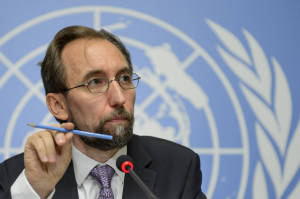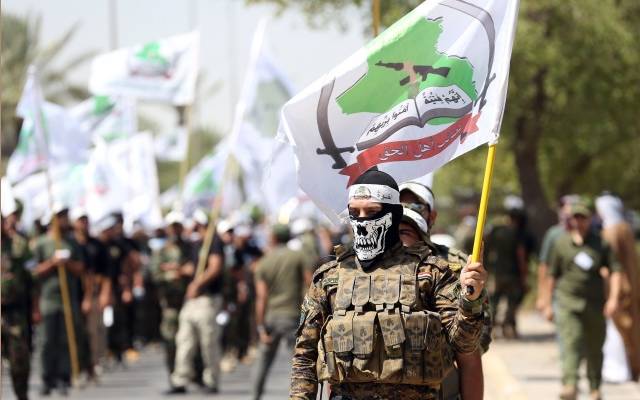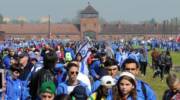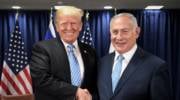
Zeid Ra’ad al-Hussein, UN High Commissioner for Human Rights (AP/Keystone, Martial Trezzini)
Iran appears to believe that the US is essentially standing behind them on the ISIS issue. This, in turn, is seen as a tacit endorsement of Iranian influence in Iraq. In fact, recent statements from key US officials on Iran’s ostensibly constructive role in the fight against ISIS have been interpreted as a green light for Iran to increase its sphere of influence in Iraq.
UN High Commissioner for Human Rights Zeid Ra’ad al-Hussein declared Tuesday that there was strong evidence that Iran-backed Shia militias had committed atrocities in the recent battle to reclaim the Iraqi city of Fallujah from the Islamic State (ISIS).
More than 900 men and boys from heavily Sunni Fallujah remain missing, and may have been kidnapped, from areas that were captured by the Shia militias, known as Popular Mobilization Forces or PMFs.
Forty-nine people who were kidnapped have been executed by Kata’ib Hezbollah, one of the PMF militias, which the United States designated a terror group in 2009 and was among the groups that killed American soldiers during the Iraq War.
Prisoners released from Kata’ib Hezbollah’s captivity have described scenes of torture and abuse. “This appears to be the worst – but far from the first – such incident involving unofficial militias fighting alongside [Iraqi] Government forces against ISIL,” Zeid said in a statement.
Kerry: Iranian Efforts in Iraq – ‘Helpful’
PMFs have been a key part of the Iraqi government’s strategy for defeating ISIS, but this has meant empowering Kata’ib Hezbollah and other Iran-backed groups that have been accused of severe human rights violations. The US was originally opposed to the presence of PMFs in anti-ISIS operations, but has since relaxed its stance, effectively allowing Iran to use the militias to dominate large swaths of the country. Secretary of State John Kerry said last week that Iranian efforts in the country have been “helpful.”
Many analysts fear that Shia militias like Kata’ib Hezbollah could worsen sectarian divides in Iraq and prevent Sunnis from reintegrating with the central government in Baghdad, possibly leading to more violent reprisals against Shia civilians.
Former US Ambassador to Iraq Zalmay Khalilzad cautioned in a Wall Street Journal interview last month that PMFs “remain a basis for continuing conflict and for conditions that lead to the rise of terror, maybe in a different name after ISIS.”
This is consistent with security expert Michael Pregent’s assessment last year, when he noted that Iran and its allied Shia militias were only fighting ISIS on the margins, refusing to extend themselves too far to fully finish them off.
In “I Saw the US Hand Iraq Over to the Iranians. Is the Whole Region Next?” which was published in the February 2015 issue of The Tower Magazine, Pregent observed:
Iran appears to believe that the U.S. is essentially standing behind them on the ISIS issue. This, in turn, is seen as a tacit endorsement of Iranian influence in Iraq. In fact, recent statements from key U.S. officials on Iran’s ostensibly constructive role in the fight against ISIS have been interpreted as a green light for Iran to increase its sphere of influence in Iraq.
As a result, what was once rumored to be true is now out in the open: Shia militias are commanded by the elite Iranian Revolutionary Guards-Quds Force. Shia militias that once targeted and killed U.S. and other coalition members now populate the ranks of Iraq’s paramilitary Popular Mobilization Units. Shia militias and their Iranian handlers are operating with impunity for the first time; not only against ISIS, but also against their Sunni enemies in general. As a result, Iran and its proxies now believe that the U.S. views them as a necessary evil on the battlefield and legitimate partners in the Iraqi government.
This has given Iran and its Shia proxies enormous influence over Iraqi politics. Recent statements from Prime Minister Haider al-Abadi, for example, promise a more inclusive government, endorsing more Sunni involvement in government ministries and Iraqi security forces. To accomplish this, however, al-Abadi must get the approval of the Shia political parties, which means he needs to get the approval of Iran.
In effect, then, Iran now has veto power over Iraqi government policies.
By: TheTower.org
Do You Love Israel? Make a Donation - Show Your Support!
Donate to vital charities that help protect Israeli citizens and inspire millions around the world to support Israel too!
Now more than ever, Israel needs your help to fight and win the war -- including on the battlefield of public opinion.
Antisemitism, anti-Israel bias and boycotts are out of control. Israel's enemies are inciting terror and violence against innocent Israelis and Jews around the world. Help us fight back!























